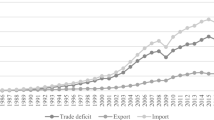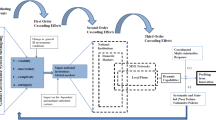Abstract
In this paper, we study the problem of designing an international telecommunication network when multiple countries are involved. Each Country has the option of cooperating in the design of the overall international network, or simply forming bilateral arrangements with individual countries. Most countries will gain by having a truly international network which allows routing via transit countries; this takes advantage of distributed peak traffic hours, and improves the network resource utilization. However there are many situations when countries may obtain greater gains by either behaving pre-emptively or by waiting for the major countries to make their decisions, and then being followers in a Stackelberg game. Using mathematical programming models, we examine conditions under which each of these behaviours are optimal.
Similar content being viewed by others
Author information
Authors and Affiliations
Corresponding author
Rights and permissions
About this article
Cite this article
Anandalingam, G., Nam, K. Conflict and cooperation in designing international telecommunication networks. J Oper Res Soc 48, 600–611 (1997). https://doi.org/10.1057/palgrave.jors.2600404
Received:
Accepted:
Published:
Issue Date:
DOI: https://doi.org/10.1057/palgrave.jors.2600404




